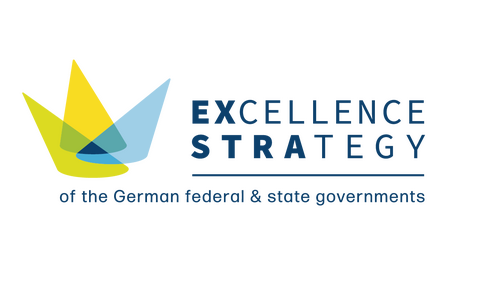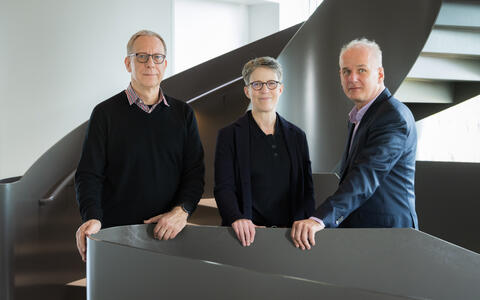Millions in funding for two Clusters of Excellence
Berlin’s vibrant research landscape shows that collaboration across institutional boundaries is a driver of success.
As part of the Excellence Strategy competition sponsored by the federal and state governments, five clusters in Berlin will each receive up to ten million euros in funding for seven years starting in January 2026. Partners of the Berlin University Alliance submitted proposals for three new clusters and the continuation seven existing projects. A committee of experts evaluated the proposals. Based on their recommendations, the Excellence Commission, consisting of the Committee of Experts and German federal and state ministers of science, announced the new and existing Clusters of Excellence that have been awarded funding on May 22, 2025. The Max Delbrück Center is involved in two of the successful clusters.
“Berlin’s vibrant research landscape shows that collaboration across institutional boundaries is a driver of success. I am particularly happy that our center is involved in two of the funded clusters – in close collaboration with Charité and the universities. My congratulations and thanks go to everyone who worked tirelessly on the applications,” says Professor Maike Sander, Scientific Director of the Max Delbrück Center. “To think of the cells in our bodies, tissues and organs as either healthy or diseased is an oversimplification – the reality is much more complex. Thanks to the latest technologies, we can now take a detailed look at the entire continuum, from healthy to disease, and identify where we can intervene, before disease actually develops.”
Enabling molecular prevention
We want to redefine precision prevention and become a driving force in the field – in Berlin, Germany and worldwide.
Most chronic inflammatory diseases develop over decades before becoming symptomatic. ImmunoPreCept, a consortium of systems medicine, clinical and experimental medicine, aims to focus on the pre-disease phase: Why do some people remain healthy, despite being exposed to the same factors that cause diseases in others? And how can diseases be detected early before they cause irreversible damage to the body? Unlike traditional medicine that treats diseases after they have developed, this approach offers the chance to intercept chronic inflammation or diseases such as cancer early on, or to prevent them by strengthening the body’s defenses. The goal is molecular prevention. Another focus of the researchers is understanding the remission phase – a pause after an illness, which despite successful therapy, is not the same as being cured.
ImmunoPreCept spokespersons are Professor Britta Siegmund, Professor Andreas Diefenbach (both at Charité – Universitätsmedizin Berlin), and Professor Nikolaus Rajewsky (Max Delbrück Center). The funding institutions are: Charité and Max Delbrück Center, Berlin Institute of Health at Charité (BIH), German Rheumatism Research Center (DRFZ), Free University of Berlin (FU), Humboldt University of Berlin (HU), Max Planck Institute for Molecular Genetics (MPI-MG), Museum of Natural History (MfN).
The spokespersons of ImmunoPreCept: Professor Andreas Diefenbach, Professor Britta Siegmund (both at Charité – Universitätsmedizin Berlin) and Professor Nikolaus Rajewsky (Max Delbrück Center).
“To cure diseases, one first has to understand what is happening in cells,” Rudolf Virchow once postulated. We now have the technical means to turn Virchow's dream into reality here in Berlin,” says Nikolaus Rajewsky, Director of the Berlin Institute for Medical Systems Biology at the Max Delbrück Center (MDC-BIMSB). “We want to redefine precision prevention and become a driving force in the field – in Berlin, Germany and worldwide.”
Shaping neuroscience in Berlin since 2007
In addition, the NeuroCure Cluster of Excellence, which was first funded in 2007, has been awarded another round of funding. With over 40 new research groups and state-of-the-art infrastructure, it has significantly shaped neuroscience research in the capital and positioned itself as a trailblazer. It focuses on understanding neurological and psychiatric disorders as well as the healthy brain. Basic research and clinical application are closely intertwined to rapidly translate scientific findings into therapies.
NeuroCure spokespersons are Professor Dietmar Schmitz and Professor Andrea Kühn (both at Charité). Funding institutions are: FU and HU, German Center for Neurodegenerative Diseases (DZNE), Leibniz Research Institute for Molecular Pharmacology (FMP), Max Delbrück Center, Max Planck Research Unit for the Science of Pathogens (MPUSP).
Further Information
- Portrait of Nikolaus Rajewsky
- Berlin University Alliance
- The German federal and state Excellence Strategy
Contact
Jana Schlütter
Editor, Communikations
Max Delbrück Center
+49 30 9406-2121
jana.schluetter@mdc-berlin.de or presse@mdc-berlin.de
- Max Delbrück Center
-
The Max Delbrück Center for Molecular Medicine in the Helmholtz Association (Max Delbrück Center) is one of the world’s leading biomedical research institutions. Max Delbrück, a Berlin native, was a Nobel laureate and one of the founders of molecular biology. At the locations in Berlin-Buch and Mitte, researchers from some 70 countries study human biology – investigating the foundations of life from its most elementary building blocks to systems-wide mechanisms. By understanding what regulates or disrupts the dynamic equilibrium of a cell, an organ, or the entire body, we can prevent diseases, diagnose them earlier, and stop their progression with tailored therapies. Patients should be able to benefit as soon as possible from basic research discoveries. This is why the Max Delbrück Center supports spin-off creation and participates in collaborative networks. It works in close partnership with Charité – Universitätsmedizin Berlin in the jointly-run Experimental and Clinical Research Center (ECRC), the Berlin Institute of Health (BIH) at Charité, and the German Center for Cardiovascular Research (DZHK). Founded in 1992, the Max Delbrück Center today employs 1,800 people and is 90 percent funded by the German federal government and 10 percent by the State of Berlin.







